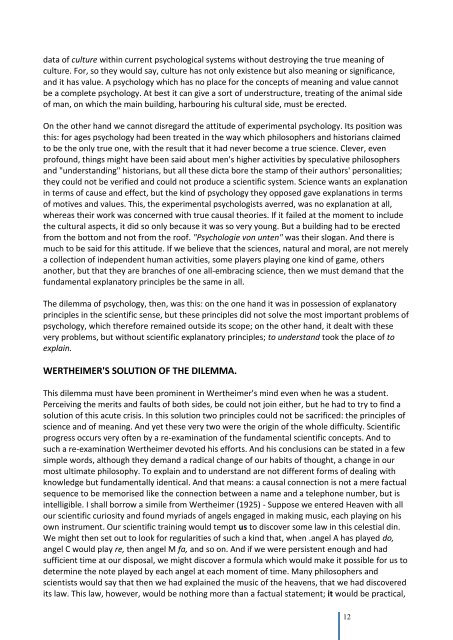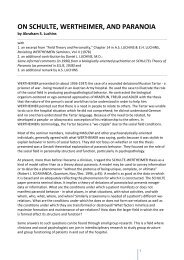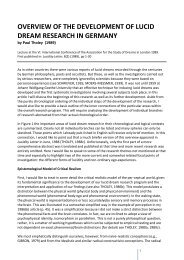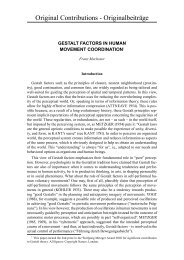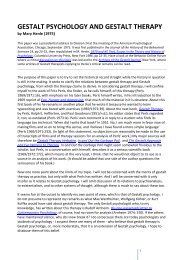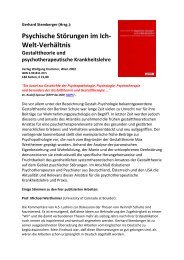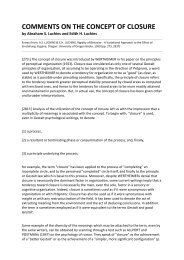Principles of Gestalt Psychology - Society for Gestalt Theory and its ...
Principles of Gestalt Psychology - Society for Gestalt Theory and its ...
Principles of Gestalt Psychology - Society for Gestalt Theory and its ...
Create successful ePaper yourself
Turn your PDF publications into a flip-book with our unique Google optimized e-Paper software.
data <strong>of</strong> culture within current psychological systems without destroying the true meaning <strong>of</strong>culture. For, so they would say, culture has not only existence but also meaning or significance,<strong>and</strong> it has value. A psychology which has no place <strong>for</strong> the concepts <strong>of</strong> meaning <strong>and</strong> value cannotbe a complete psychology. At best it can give a sort <strong>of</strong> understructure, treating <strong>of</strong> the animal side<strong>of</strong> man, on which the main building, harbouring his cultural side, must be erected.On the other h<strong>and</strong> we cannot disregard the attitude <strong>of</strong> experimental psychology. Its position wasthis: <strong>for</strong> ages psychology had been treated in the way which philosophers <strong>and</strong> historians claimedto be the only true one, with the result that it had never become a true science. Clever, evenpr<strong>of</strong>ound, things might have been said about men's higher activities by speculative philosophers<strong>and</strong> "underst<strong>and</strong>ing" historians, but all these dicta bore the stamp <strong>of</strong> their authors' personalities;they could not be verified <strong>and</strong> could not produce a scientific system. Science wants an explanationin terms <strong>of</strong> cause <strong>and</strong> effect, but the kind <strong>of</strong> psychology they opposed gave explanations in terms<strong>of</strong> motives <strong>and</strong> values. This, the experimental psychologists averred, was no explanation at all,whereas their work was concerned with true causal theories. If it failed at the moment to includethe cultural aspects, it did so only because it was so very young. But a building had to be erectedfrom the bottom <strong>and</strong> not from the ro<strong>of</strong>. "Psychologie von unten" was their slogan. And there ismuch to be said <strong>for</strong> this attitude. If we believe that the sciences, natural <strong>and</strong> moral, are not merelya collection <strong>of</strong> independent human activities, some players playing one kind <strong>of</strong> game, othersanother, but that they are branches <strong>of</strong> one all-embracing science, then we must dem<strong>and</strong> that thefundamental explanatory principles be the same in all.The dilemma <strong>of</strong> psychology, then, was this: on the one h<strong>and</strong> it was in possession <strong>of</strong> explanatoryprinciples in the scientific sense, but these principles did not solve the most important problems <strong>of</strong>psychology, which there<strong>for</strong>e remained outside <strong>its</strong> scope; on the other h<strong>and</strong>, it dealt with thesevery problems, but without scientific explanatory principles; to underst<strong>and</strong> took the place <strong>of</strong> toexplain.WERTHEIMER'S SOLUTION OF THE DILEMMA.This dilemma must have been prominent in Wertheimer's mind even when he was a student.Perceiving the mer<strong>its</strong> <strong>and</strong> faults <strong>of</strong> both sides, be could not join either, but he had to try to find asolution <strong>of</strong> this acute crisis. In this solution two principles could not be sacrificed: the principles <strong>of</strong>science <strong>and</strong> <strong>of</strong> meaning. And yet these very two were the origin <strong>of</strong> the whole difficulty. Scientificprogress occurs very <strong>of</strong>ten by a re-examination <strong>of</strong> the fundamental scientific concepts. And tosuch a re-examination Wertheimer devoted his ef<strong>for</strong>ts. And his conclusions can be stated in a fewsimple words, although they dem<strong>and</strong> a radical change <strong>of</strong> our hab<strong>its</strong> <strong>of</strong> thought, a change in ourmost ultimate philosophy. To explain <strong>and</strong> to underst<strong>and</strong> are not different <strong>for</strong>ms <strong>of</strong> dealing withknowledge but fundamentally identical. And that means: a causal connection is not a mere factualsequence to be memorised like the connection between a name <strong>and</strong> a telephone number, but isintelligible. I shall borrow a simile from Wertheimer (1925) - Suppose we entered Heaven with allour scientific curiosity <strong>and</strong> found myriads <strong>of</strong> angels engaged in making music, each playing on hisown instrument. Our scientific training would tempt us to discover some law in this celestial din.We might then set out to look <strong>for</strong> regularities <strong>of</strong> such a kind that, when .angel A has played do,angel C would play re, then angel M fa, <strong>and</strong> so on. And if we were persistent enough <strong>and</strong> hadsufficient time at our disposal, we might discover a <strong>for</strong>mula which would make it possible <strong>for</strong> us todetermine the note played by each angel at each moment <strong>of</strong> time. Many philosophers <strong>and</strong>scientists would say that then we had explained the music <strong>of</strong> the heavens, that we had discovered<strong>its</strong> law. This law, however, would be nothing more than a factual statement; it would be practical,12


